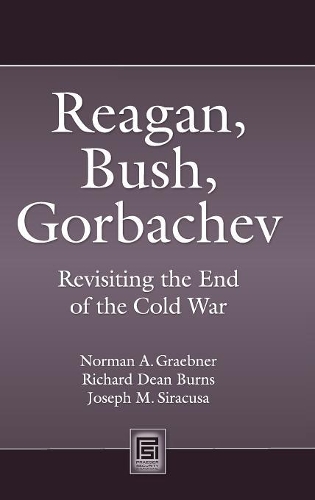
Reagan, Bush, Gorbachev: Revisiting the End of the Cold War
(Hardback)
Available Formats
Publishing Details
Reagan, Bush, Gorbachev: Revisiting the End of the Cold War
By (Author) Norman A. Graebner
By (author) Richard Dean Burns
By (author) Joseph M. Siracusa
Bloomsbury Publishing PLC
Praeger Publishers Inc
30th June 2008
United States
Classifications
General
Non Fiction
International relations
909.828
Physical Properties
Hardback
188
Width 156mm, Height 235mm
425g
Description
This work is a contemporary chronicle of the Cold War and offers an analysis of policy and rhetoric of the United States and Soviet Union during the 1980s. The authors examine the assumptions that drove political decisions and the rhetoric that defined the relationship as the Soviet Union began to implode. This work demonstrates that while the subsequent unraveling of the Soviet empire was an unintended side effect of Mikhail Gorbachev's reforms, termination of the Cold War was not. Ronald Reagan deserves full credit for recognizing Gorbachev's sincerity and his determination to change the direction of Soviet policies. For this, Reagan felt the full wrath of anticommunist hawks for doing business with a communist leader. But it was Gorbachev who concluded the superpowers had become mesmerized by ideological myths which ruled out any meaningful discussions of a possible accommodation of political issues for more than four decades. The evidence is compelling that Gorbachev himself broke the Cold War's ideological straight jacket that had paralyzed Moscow and Washington's ability to resolve their differences. Though politically weakened, Gorbachev conceded nothing to U.S. military superiority. Never did he negotiate from a position of weakness. In doing so, the last Soviet leader faced even greater political and physical risk. Without Gorbachev the end of the Cold War could have played out very differently and perhaps with great danger.
Reviews
Three distinguished traditional diplomatic historians joined forces to produce this exceptional chronicle of the fall of the Soviet Union and the end of the Cold War. While it breaks no new research ground, it is narrative history at its best, full of insightful interpretations delivered in a most readable format.Undoubtedly, as archives open up, new insights and interpretations will emerge, but for the moment this is the best accounting available.Recommended. All readership levels. * Choice *
It is in that sense an argument against the ideological vision that drove the Reagan administration and the construction of erroneous policies, particularly in regional conflicts in Central America. For these reasons. if not the originality of content, the book deserves a close reading among the current trends in the literature and cultural reconstructions of the Reagan administration. * International Affairs *
Author Bio
Norman A. Graebner is Randolph P. Compton Professor of History and Public Affairs Emeritus, the University of Virginia and is the recipient of the university's highest honor, the Thomas Jefferson Award. He is an internationally acknowledged authority on United States and American diplomacy. He was a Harold Vyvyan Harmsworth Professor of American History at Oxford University and a Thomas Jefferson Visiting Scholar at Downing College, Cambridge. He is the author, co-author, or editor of more than thirty books and some 130 articles, essays, and book chapters, including Empire on the Pacific: A Study in American Continental Expansion (1955, 1983), Foundations of American Foreign Policy: A Realist Appraisal from Franklin to McKinley (1985), and America as a World Power: A Realist Appraisal from Wilson to Reagan (1984). Richard Dean Burns is Professor Emeritus and former chair of the History Department at California State University, Los Angeles. He has authored and edited more than a dozen books and two dozen articles covering arms control, diplomatic history, international law, and American foreign policy. Most recently, he co-authored The Quest for Missile Defense, 19442003 (2004). His other publications include an edited three-volume, Encyclopedia of Arms Control and Disarmament (1993), a co-edited three-volume Encyclopedia of American Foreign Policy, Second Edition (2002), an edited three-volume Chronological History of United States Foreign Relations (2002), and Cold War Chronology, 19171992 (2005). Joseph M. Siracusa is Professor of International Diplomacy and Director of Global Studies in the School of Global Studies, Social Science and Planning, at the Royal Melbourne Institute of Technology where he is a specialist in nuclear politics and global security. A native of Chicago and long-time resident of Australia, he is internationally known for his writings on nuclear history, diplomacy, and presidential politics. He is also a frequent political affairs commentator in the Australian media, including ABC Radio National. His books include A History of United States Foreign Policy, Depression to Cold War: A History of America from Herbert Hoover to Ronald Reagan (with David G. Coleman), Presidential Profiles: The Kennedy Years, and Real-World Nuclear Deterrence: The Making of International Strategy (with David G. Coleman).
